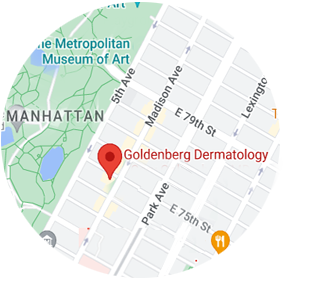
MEDICAL TREATMENTS
Our doctors are dermatologists whose skills and experience range from advanced medical treatments and surgeries to cosmetic solutions. Actively involved in research and contributing to the medical understanding of dermatological conditions, our doctors research and see patients each day with skin conditions that require medical attention. They are often invited as experts to contribute their views onTV, in newspapers and magazines regarding advancements in the field.
At Goldenberg Dermatology, we routinely treat patients with chronic skin conditions. Although currently incurable, autoimmune disorders such as psoriasis and eczema can be effectively treated and have their recurrences significantly reduced. Light therapy is often recommended. It is a popular, painless, and extremely effective option. Narrow Band UVB Therapy involves targeting affected areas with controlled doses of ultraviolet light, reducing the number of cells responsible for outbreaks. This is a great non-invasive way to treat certain skin conditions without the need for chemicals or oral medication. However, there are certain medications (see Biologics) that have been proven to help patients suffering from more severe cases of psoriasis.
There are a variety of sexually transmitted diseases (STDs) that may affect the appearance of skin and could lead to more serious health problems. The Human Papillomavirus (HPV) is known to be associated with genital warts, and can be spread very easily, which necessitates its effective treatment. Molluscum, another viral infection often spread through sexual contact, is also highly contagious and results in unsightly physical changes to the skin. Both can be treated by excision and a variety of topical treatments.
With age, natural wear, and constant sun exposure, the skin is subject to developing areas of discoloration. While generally harmless and mostly treated for cosmetic purposes, certain patches of discoloration may point toward possible development of skin cancer. Scaly lesions that appear on sun-exposed areas may be a sign of actinic keratosis, a precancerous skin condition. Our doctors are very knowledgeable at helping patients deal with and take preemptive measures to prevent serious complications associated with solar damage. Moles, or nevi, are common in all people and are generally harmless — however, asymmetrical moles are often the first thing looked for in searching for possible malignancies. Moles and skin lesions and can be easily removed through minor surgery or cryotherapy, in which liquid nitrogen is used to eliminate the affected cells.
Acne is a problem that afflicts almost everyone at some point in their lives, with some people being more severely affected than others. Acne can be reasonably treated by killing the bacteria responsible as well as targeting and weakening the sweat glands near the surface of the skin. Photodynamic light therapy (PDT) is a treatment similar to other light-based therapies, in which certain acne areas of the skin are targeted directly by a laser. More severe cases of acne may require more aggressive approaches, including minimally-invasive surgical excision or steroid injections directly into cysts. Powerful oral medications have been approved for use for patients with extremely severe acne.











